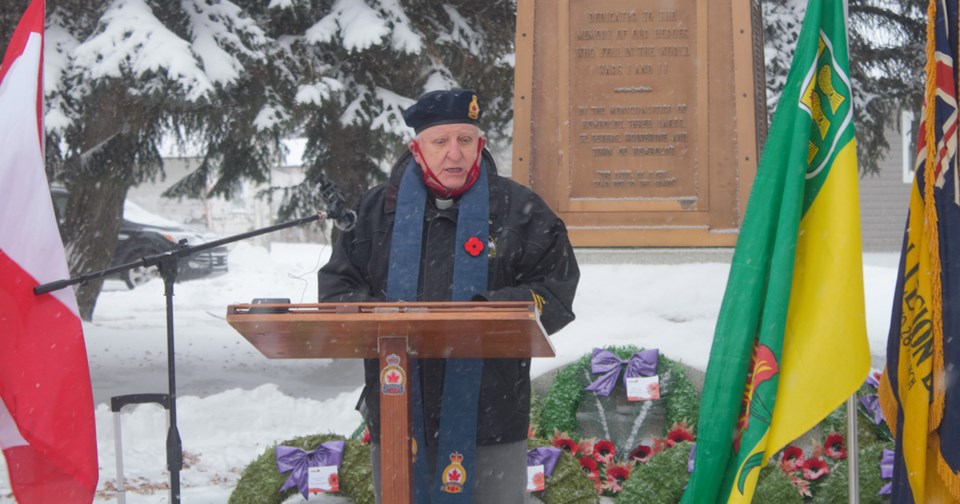HUMBOLDT — Al Hingley delivered a prayer and speech during Humboldt’s Remembrance Day ceremony, reflecting on his time as a child in WWII when his community found themselves needing to adorn masks for their safety in the ongoing war.
“Our surroundings and our gathering this year are different than our former gatherings, but the intent is as sincere and our mindfulness of them just as significant,” Hingley said to the crowd gathered around the cenotaph.
“Preparing for today in the midst of COVID-19, it came to me how similar is a world on the battlefield as a world battling a pandemic.”
Hingley is a retired United Church reverend, curator of the Benson-Hingley Military Museum in the basement of the Humboldt Legion and holds a master’s degree in history.
As a child during the Second World War, he lived in Trenton, N.S. The community was dominated by a large steel plant, which during the war was devoted to producing ammunition.
“On the advice of health officials we were urged to wear facial coverings for the protection of ourselves and each other, in wartime masks of protection were worn also – especially in battle if deadly gas was in use as a weapon,” Hingley said.
He added that in the museum today is the same mask that he wore to and from school.
“The enemy subs known as U-boats were constantly in that harbor as participants in the Battle of the St. Lawrence. It was a constant worry that they might turn their attention to an attack on the munitions plant and use deadly gas to subdue the civilian population.”
In response, each day his school would hold a “gas alert” similar to a fire drill. During these drills the students would adorn their personal masks and the teachers would inspect them to make sure they were on tight.
During the night, if an air raid sounded, the civilian population was taught to put up tar paper on wooden frames against the windows to prevent any light from being seen from the sky at night.
Many of the crowd listening to his speech on Nov. 11 had their own masks adorning their faces.
“Both battles on the warfront and the Homefront brought increasingly large numbers of loss of life, with the accompanying experience of losing loved ones far away from home and family in another country, or in places of care closer but closed to visitors – preventing opportunities to be at the loved ones side and the last goodbye.”
Hingley said such forced separation brings its own kind of despair, which can last long afterwards.
“Wherever the battles were and are being fought, strong and sometimes small groups of defenders arise. With the pandemic are the frontline medical people, store clerks, homecare workers, teachers – who at personal risk face the enemy bravely.”
Near the end of his speech, Hingley reflected on the words of Queen Elizabeth II in her famous “Never Give up, Never Despair” speech during Victory in Europe Day.
On that day, in 1945, Queen Elizabeth II was quoted as saying: “At the start, the outlook seemed bleak, the end distant, the outcome uncertain. But we kept faith that the cause was right – and this belief, as my father noted in his broadcast, carried us through. Never give up, never despair.”
“That is the message then as it is now,” Hingley noted.
In an interview with the Humboldt Journal after the speech, he said what he wanted people to get out of his words is remembrance as well as some hope through our current situation.
“Authorities told us that [wearing masks] was the thing to do, so we did it,” he said. “Now authorities are telling us to do it, so we do it because we have to think about each other.”



